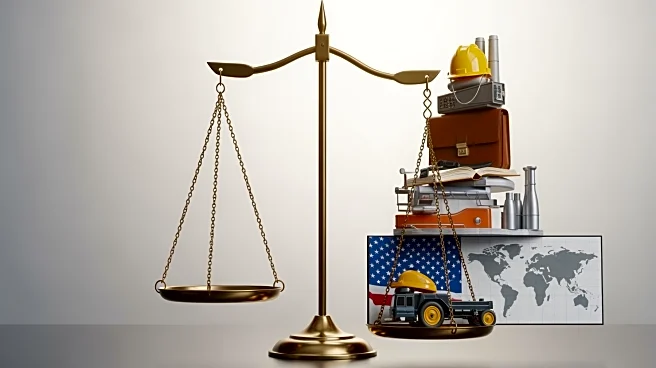What's Happening?
Rick Woldenberg, CEO of Learning Resources, has taken his legal battle against President Trump's tariffs to the Supreme Court. Woldenberg argues that the tariffs, introduced by the Trump administration on 'Liberation Day,' represent an illegal executive
power grab. The case, which follows a lower court ruling in favor of Woldenberg, questions the president's authority to impose tariffs in response to national emergencies such as trade deficits and illegal migration. Woldenberg's company, which manufactures educational toys primarily in Asia, has been significantly affected by these tariffs, paying between $5 million and $10 million this year alone. The Supreme Court's decision could lead to a refund of billions in tariff revenue to American companies, impacting the economic landscape.
Why It's Important?
The outcome of this Supreme Court case holds significant implications for U.S. businesses and the broader economy. If the Court rules in favor of Woldenberg, it could trigger a wave of tariff refunds, providing financial relief to companies affected by the tariffs. This decision could also set a precedent regarding the limits of presidential authority in imposing tariffs, potentially reshaping future trade policies. Conversely, if the Court upholds the tariffs, it could affirm the president's ability to use tariffs as a tool for addressing national emergencies, impacting trade relations and economic strategies. The case highlights the tension between executive power and business interests, with potential consequences for international trade dynamics.
What's Next?
The Supreme Court's decision is awaited, with potential ramifications for both the Trump administration and U.S. businesses. If the Court sides with Woldenberg, the administration may face pressure to refund tariff revenues, affecting fiscal policies and economic planning. Businesses may need to reassess their production strategies and international partnerships in response to the ruling. Additionally, the decision could influence future legislative and executive actions regarding trade and economic policy, prompting discussions among policymakers and industry leaders about the balance between national security and economic interests.
Beyond the Headlines
This case underscores the broader debate over the use of tariffs as a political and economic tool. It raises questions about the ethical and legal dimensions of executive power in trade policy, as well as the impact on global supply chains and international relations. The decision could influence how future administrations approach trade negotiations and economic diplomacy, potentially affecting the U.S.'s role in the global economy. The case also highlights the challenges businesses face in navigating complex regulatory environments and adapting to shifting political landscapes.















